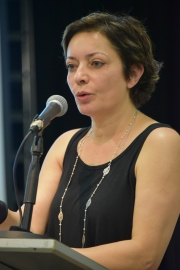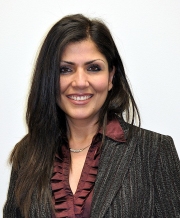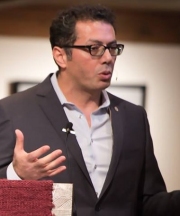Videos of opening comments by Nadia Naser-Najjab, Samah Sabawi, and Ramzy Baroud.
Deep scepticism about the upcoming Palestinian elections was expressed by all three speakers during our illuminating discussion held last night over Zoom: Palestine: Democracy Under Occupation?
Though Nadia Najjab, Ramzy Baroud and Samah Sabawi all agreed that a democratic culture is ingrained in Palestinian political and civil life, they argued that this year's legislative, Presidential and council elections called by President Mahmoud Abbas have little to do with the genuine expression of Palestinian political will and are likely to achieve little material change for ordinary people.
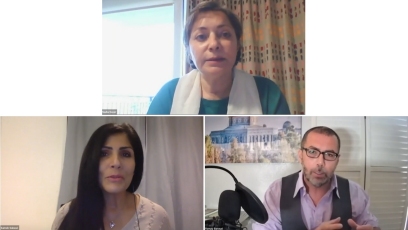 Nadia, based in Exeter in the UK, first set out the historical context to the elections, describing how division and factionalism was built into the political system by the Oslo Accords of 1995, which created the Palestinian Authority.
She said the Accords had created 'an elite class with a VIP system,' uninterested in challenging the status quo and detached from Palestinian people.
Nadia, based in Exeter in the UK, first set out the historical context to the elections, describing how division and factionalism was built into the political system by the Oslo Accords of 1995, which created the Palestinian Authority.
She said the Accords had created 'an elite class with a VIP system,' uninterested in challenging the status quo and detached from Palestinian people.
'The agreement also divided the West Bank into three areas under different jurisdictions,' she explained. 'It disconnected Gaza from the West Bank. Jerusalem was closed just before signing the agreement and became subject to a permit system that Israel tightened throughout the years.''
And while the Palestinian Legislative Council enjoyed limited power in certain spheres, Israel maintained control over security. Nadia also explained that the election result in 2006, which brought Hamas to power, was rejected by the international community and led to the Israeli blockade of Gaza.
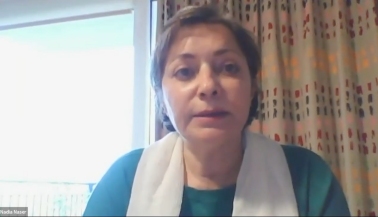 'The democratic system pre-Oslo included parties with a unified national plan about ending the occupation, about the crucial issues which Oslo postponed to a later stage - for example, the refugees, Jerusalem, the settlements. They had a clear vision about it.
'The democratic system pre-Oslo included parties with a unified national plan about ending the occupation, about the crucial issues which Oslo postponed to a later stage - for example, the refugees, Jerusalem, the settlements. They had a clear vision about it.
'Of course Israel does not want Palestinians practicing democracy but the internal problem is Palestinians have to reform their political system, unify their national plan to be able to challenge Israel's repressive measures and practice democracy. '
Samah, speaking from Queensland, Australia, further outlined the divisiveness of the proposed elections, which do not include people like herself, the shatat (the diaspora), those who have been dispossessed from their homes and now make up around two thirds of the Palestinian population.
She said: 'This election is just for those who are part of that idea of a Palestinian state, who are living under occupation in Gaza, the West Bank and East Jerusalem.'
It is this division, she argued, which lies at the heart of Palestinian politics today.
'The very nature of the exclusion and division that has been cemented through years of occupation, of Oslo negotiations, of Palestinian Authority failures, and Hamas and Fatah squabbles, not to mention the Israeli apartheid system, which is built and based on separation and segregation, these divisions are really heightened during these elections because the nature of these elections are exclusive and not inclusive.'
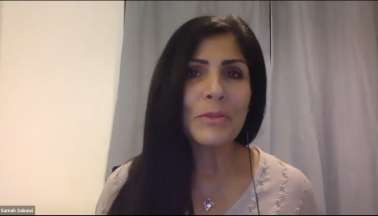 And though Samah said there were some positives to be taken from the elections - for example, that 93% of adults had registered to vote and there were 36 approved parliamentary lists - she insisted this must be viewed within the framework of Israel as a settler-colonialist expansionist project 'predicated on the continued forceful dispossession of the Palestinian people whom it occupies.'
And though Samah said there were some positives to be taken from the elections - for example, that 93% of adults had registered to vote and there were 36 approved parliamentary lists - she insisted this must be viewed within the framework of Israel as a settler-colonialist expansionist project 'predicated on the continued forceful dispossession of the Palestinian people whom it occupies.'
'It is a fact that Israel controls every aspect of the occupied Palestinian people's lives - their economy, their security, their borders, their birth registry, all entry and exit permits, including their ability to travel from one village to the next. And so much more than that.'
The elections, she said, had been called 'to appease the donor community' and for the credibility for the Palestinian Authority, and the evidence was the order in which they were being held - first legislative, then presidential and finally the Palestinian National Council (PNC).
'The PNC serves as the Parliament that is representative of all Palestinians inside and outside the territories,' she explained, making the case that the PNC elections and reforms to the PLO should be the first step, not the last, in the sequence of elections. 'Why not strengthen worldwide representation of all Palestinians? Aren't we stronger when we are united and when we are truly and accurately represented?'
The Palestinian Legislative elections would not 'revive the national liberation movement or be representative of all Palestinians inside and out of Palestine', she said.
The problem was the existence of an authority and security apparatus 'subservient to a settler colonialist regime.'
She predicted that the elections, if they go ahead, are likely to 'further entrench the system and give it a new veneer of credibility' and that the Palestinian Authority was 'a powerless democracy which lacks control over basic life.'
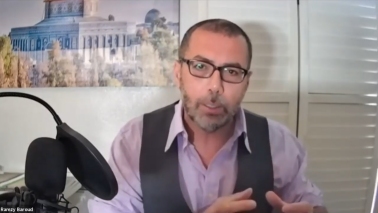 Dr Ramzy Baroud, based in Seattle, Washington, agreed that while a democratic culture has long been in evidence within Palestinian society, the elections proposed by Abbas have 'nothing to do with democracy whatsoever.'
Dr Ramzy Baroud, based in Seattle, Washington, agreed that while a democratic culture has long been in evidence within Palestinian society, the elections proposed by Abbas have 'nothing to do with democracy whatsoever.'
He said: 'The question we need to ask is - what is the point? What are they trying to achieve? Are they trying to achieve political unity? We are a liberation movement. Political unity does not need elections to be achieved. I don't know of any liberation movement anywhere in the southern hemisphere that went through the process of state-building before the process of liberation itself.'
Ramzy said the Palestinian ruling class had taken the Palestinian people on a 'bewildering journey of state-building.'
'They have titles as Presidents and Ministers, Your Highness and His Excellency and so on and yet the people are still living under siege and being shot at by Israeli snipers,' he said.
'And they have to line up before Israeli checkpoints in order to be able to go to their schools, to go to their farms, their hospitals, to go to work.'
There exists, he said, 'a small group of people getting richer and a much larger mass of people getting poorer.'
But while the elections themselves were called to satisfy the American donors and release funding withheld by the Trump administration, Ramzy insisted there was now a possibility of a genuine challenge to the status quo in the form of imprisoned Palestinian leader Marwan Barghouti.
'Marwan is a very important political figure,' Ramzy explained. 'If an election were held today, tomorrow or 10 years ago he would have won and become the President of the Palestinian Authority.'
Marwan founded the Fatah youth group and was close to Yasser Arafat and, despite being imprisoned for the best part of two decades, mostly in solitary confinement and absent from the Palestinian political scene, all polls indicate he is likely to win the Presidency.
Thus, Abbas is now considering cancelling the elections - a move which Ramzy argues could potentially break the Fatah movement altogether.
Of the One Democratic State Campaign Ramzy said it did not matter whether there was '...one, two or ten states'.
'The issue is we need to defeat apartheid, we need to end the system of racism and discrimination and we need to roll back the Israeli military occupation.'
All speakers agreed the path to liberation lay in resistance, not further state-building.
Ramzy concluded: 'We have been trapped in all this terminology since Oslo that displaced the actual terminologies we should have been using: liberation, decolonisation, national unity.
'What happened was we even changed our target audience altogether, to Washington, London and Oslo and Madrid, instead of being our own people.
'So the real path is to go back to the streets of Palestine, to connect with the Palestinian people, to bridge the gap that was created by all these geopolitical divisions, between the West Bank, and Gaza, between areas A, B and C, and our brothers in Israel itself.
'And of course the shatat, millions of us, we need to have a national conversation that exceeds the Fatah/Hamas factional narrative. We need to go back to the old language and develop a project of liberation that is predicated on resistance and nothing but resistance.'
Our heartfelt thanks goes to our three wonderful speakers for their expert analysis at this critical time, helping those of us within the international solidarity movement to understand the issues and the significance of the political changes now occurring.
Palestinians head to the polls next month for the first time in 15 years - but what does it all mean?
How does democracy operate under occupation and what are the likely outcomes?
To discuss, analyse and understand the upcoming elections we have put together a fantastic line up of speakers: Ramzy Baroud, Nadia Naser-Najjab and Samah Sabawi.
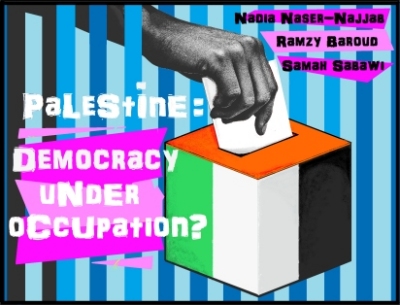 Together, our speakers will set the historical context and answer crucial questions, such as:
Together, our speakers will set the historical context and answer crucial questions, such as:
What is the significance of these elections?
What likely changes will they bring?
Who are the main players and how will they affect the outcome?
What effect does the occupation have on the democratic process?
Where does the One Democratic State Campaign fit into the political landscape?
How politicised are young people and how will their vote affect the outcome?
Hosted by HRPSC Chair Katy Colley, the meeting is free to join and all are welcome. Q&A's at the end. Registration essential.
Though Nadia Najjab, Ramzy Baroud and Samah Sabawi all agreed that a democratic culture is ingrained in Palestinian political and civil life, they argued that this year's legislative, Presidential and council elections called by President Mahmoud Abbas have little to do with the genuine expression of Palestinian political will and are likely to achieve little material change for ordinary people.
 Nadia, based in Exeter in the UK, first set out the historical context to the elections, describing how division and factionalism was built into the political system by the Oslo Accords of 1995, which created the Palestinian Authority.
She said the Accords had created 'an elite class with a VIP system,' uninterested in challenging the status quo and detached from Palestinian people.
Nadia, based in Exeter in the UK, first set out the historical context to the elections, describing how division and factionalism was built into the political system by the Oslo Accords of 1995, which created the Palestinian Authority.
She said the Accords had created 'an elite class with a VIP system,' uninterested in challenging the status quo and detached from Palestinian people.'The agreement also divided the West Bank into three areas under different jurisdictions,' she explained. 'It disconnected Gaza from the West Bank. Jerusalem was closed just before signing the agreement and became subject to a permit system that Israel tightened throughout the years.''
And while the Palestinian Legislative Council enjoyed limited power in certain spheres, Israel maintained control over security. Nadia also explained that the election result in 2006, which brought Hamas to power, was rejected by the international community and led to the Israeli blockade of Gaza.
 'The democratic system pre-Oslo included parties with a unified national plan about ending the occupation, about the crucial issues which Oslo postponed to a later stage - for example, the refugees, Jerusalem, the settlements. They had a clear vision about it.
'The democratic system pre-Oslo included parties with a unified national plan about ending the occupation, about the crucial issues which Oslo postponed to a later stage - for example, the refugees, Jerusalem, the settlements. They had a clear vision about it.'Of course Israel does not want Palestinians practicing democracy but the internal problem is Palestinians have to reform their political system, unify their national plan to be able to challenge Israel's repressive measures and practice democracy. '
Samah, speaking from Queensland, Australia, further outlined the divisiveness of the proposed elections, which do not include people like herself, the shatat (the diaspora), those who have been dispossessed from their homes and now make up around two thirds of the Palestinian population.
She said: 'This election is just for those who are part of that idea of a Palestinian state, who are living under occupation in Gaza, the West Bank and East Jerusalem.'
It is this division, she argued, which lies at the heart of Palestinian politics today.
'The very nature of the exclusion and division that has been cemented through years of occupation, of Oslo negotiations, of Palestinian Authority failures, and Hamas and Fatah squabbles, not to mention the Israeli apartheid system, which is built and based on separation and segregation, these divisions are really heightened during these elections because the nature of these elections are exclusive and not inclusive.'
 And though Samah said there were some positives to be taken from the elections - for example, that 93% of adults had registered to vote and there were 36 approved parliamentary lists - she insisted this must be viewed within the framework of Israel as a settler-colonialist expansionist project 'predicated on the continued forceful dispossession of the Palestinian people whom it occupies.'
And though Samah said there were some positives to be taken from the elections - for example, that 93% of adults had registered to vote and there were 36 approved parliamentary lists - she insisted this must be viewed within the framework of Israel as a settler-colonialist expansionist project 'predicated on the continued forceful dispossession of the Palestinian people whom it occupies.''It is a fact that Israel controls every aspect of the occupied Palestinian people's lives - their economy, their security, their borders, their birth registry, all entry and exit permits, including their ability to travel from one village to the next. And so much more than that.'
The elections, she said, had been called 'to appease the donor community' and for the credibility for the Palestinian Authority, and the evidence was the order in which they were being held - first legislative, then presidential and finally the Palestinian National Council (PNC).
'The PNC serves as the Parliament that is representative of all Palestinians inside and outside the territories,' she explained, making the case that the PNC elections and reforms to the PLO should be the first step, not the last, in the sequence of elections. 'Why not strengthen worldwide representation of all Palestinians? Aren't we stronger when we are united and when we are truly and accurately represented?'
The Palestinian Legislative elections would not 'revive the national liberation movement or be representative of all Palestinians inside and out of Palestine', she said.
The problem was the existence of an authority and security apparatus 'subservient to a settler colonialist regime.'
She predicted that the elections, if they go ahead, are likely to 'further entrench the system and give it a new veneer of credibility' and that the Palestinian Authority was 'a powerless democracy which lacks control over basic life.'
 Dr Ramzy Baroud, based in Seattle, Washington, agreed that while a democratic culture has long been in evidence within Palestinian society, the elections proposed by Abbas have 'nothing to do with democracy whatsoever.'
Dr Ramzy Baroud, based in Seattle, Washington, agreed that while a democratic culture has long been in evidence within Palestinian society, the elections proposed by Abbas have 'nothing to do with democracy whatsoever.'He said: 'The question we need to ask is - what is the point? What are they trying to achieve? Are they trying to achieve political unity? We are a liberation movement. Political unity does not need elections to be achieved. I don't know of any liberation movement anywhere in the southern hemisphere that went through the process of state-building before the process of liberation itself.'
Ramzy said the Palestinian ruling class had taken the Palestinian people on a 'bewildering journey of state-building.'
'They have titles as Presidents and Ministers, Your Highness and His Excellency and so on and yet the people are still living under siege and being shot at by Israeli snipers,' he said.
'And they have to line up before Israeli checkpoints in order to be able to go to their schools, to go to their farms, their hospitals, to go to work.'
There exists, he said, 'a small group of people getting richer and a much larger mass of people getting poorer.'
But while the elections themselves were called to satisfy the American donors and release funding withheld by the Trump administration, Ramzy insisted there was now a possibility of a genuine challenge to the status quo in the form of imprisoned Palestinian leader Marwan Barghouti.
'Marwan is a very important political figure,' Ramzy explained. 'If an election were held today, tomorrow or 10 years ago he would have won and become the President of the Palestinian Authority.'
Marwan founded the Fatah youth group and was close to Yasser Arafat and, despite being imprisoned for the best part of two decades, mostly in solitary confinement and absent from the Palestinian political scene, all polls indicate he is likely to win the Presidency.
Thus, Abbas is now considering cancelling the elections - a move which Ramzy argues could potentially break the Fatah movement altogether.
Of the One Democratic State Campaign Ramzy said it did not matter whether there was '...one, two or ten states'.
'The issue is we need to defeat apartheid, we need to end the system of racism and discrimination and we need to roll back the Israeli military occupation.'
All speakers agreed the path to liberation lay in resistance, not further state-building.
Ramzy concluded: 'We have been trapped in all this terminology since Oslo that displaced the actual terminologies we should have been using: liberation, decolonisation, national unity.
'What happened was we even changed our target audience altogether, to Washington, London and Oslo and Madrid, instead of being our own people.
'So the real path is to go back to the streets of Palestine, to connect with the Palestinian people, to bridge the gap that was created by all these geopolitical divisions, between the West Bank, and Gaza, between areas A, B and C, and our brothers in Israel itself.
'And of course the shatat, millions of us, we need to have a national conversation that exceeds the Fatah/Hamas factional narrative. We need to go back to the old language and develop a project of liberation that is predicated on resistance and nothing but resistance.'
Our heartfelt thanks goes to our three wonderful speakers for their expert analysis at this critical time, helping those of us within the international solidarity movement to understand the issues and the significance of the political changes now occurring.
Our press release distributed prior to the meeting:
Palestinians head to the polls next month for the first time in 15 years - but what does it all mean?
How does democracy operate under occupation and what are the likely outcomes?
To discuss, analyse and understand the upcoming elections we have put together a fantastic line up of speakers: Ramzy Baroud, Nadia Naser-Najjab and Samah Sabawi.
 Together, our speakers will set the historical context and answer crucial questions, such as:
Together, our speakers will set the historical context and answer crucial questions, such as:Hosted by HRPSC Chair Katy Colley, the meeting is free to join and all are welcome. Q&A's at the end. Registration essential.
